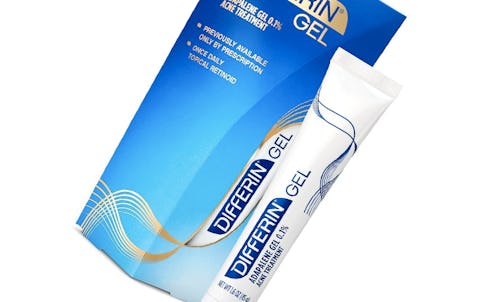Style
The Best OTC Acne Treatment, According To A Dermatologist
Treating acne without a prescription isn't always easy. Trust me, I know: I tried for years to find the best over-the-counter acne treatment, convincing myself that I was making progress until that time of the month rolled around and newer, angrier breakouts popped up all over again. If this sounds familiar to you, it might mean a visit to the dermatologist is in order. If you're determined to conquer your breakouts alone, there is a prescription-strength option out there that you can get without a prescription: Retinoids.
Retinoids, a class of drug that includes adapalene, have long been prescribed by dermatologists to clear up mild to moderate acne, but it wasn't until recently that you could purchase one without a prescription. So, what is it that makes retinoids so amazing that dermatologists have stuck behind them for years? According to Dr. Elizabeth Tanzi, MD, of Capital Laser and Skin Care in Bethesda, Maryland, "Retinoids help acne by making the pores “less sticky” so they are less likely to clog and cause acne."
According to Dr. Tanzi, the gentle chemical exfoliation that retinoids provide means less dead skin cells and other gunk can find their way into your pores to begin with. So, unlike many over-the-counter treatments, retinoids are actually preventative.
If you've yet to try a retinoid for your acne, it can be difficult to know what you're looking for. A retinoid called "adapalene" is the active ingredient in Differin Gel, the first over-the-counter acne treatment to be approved by the FDA in over 30 years. And, all it takes is a pea-sized dose of this $12 gel nightly, so one tube can stretch pretty far.
Dr. Tanzi recommends starting adapalene slowly — and sticking with it unless serious irritation occurs. "Start out using adapalene every other night for 1-2 weeks," she says, "Then advance to every night if tolerated."
Once your skin is used to the new addition, she suggests using a product containing either salicylic acid or benzoyl peroxide in the morning. This can help you get the most out of your treatment, provided that your skin isn't becoming too dry.
The downside to retinoids is that they don't provide results overnight. In fact, most people see an increase in dryness, irritation, and even breakouts in the first weeks — which can, no doubt, be disheartening. Dr. Tanzi's final word of advice to anyone interested in treating their acne with adapalene is all about persistence. "Don’t give up at the first sign of irritation," cautions Dr. Tanzi, "It will take about four weeks to see improvement in the skin." If your breakouts aren't starting to slow down at that point, it's best to check in with a dermatologist.
Starting a retinoid may also mean making some changes to your current skin care routine, especially if it includes other products intended to treat acne. Since retinoids can make your skin more prone to irritation and redness, keeping your other products simple is key. You'll need a gentle cleanser and a great moisturizer for acne prone skin, and — this one is not optional — you're going to need a reliable sunscreen you feel good about applying every day.
Bustle may receive a portion of sales from products purchased from this article, which was created independently from Bustle's editorial and sales departments.
